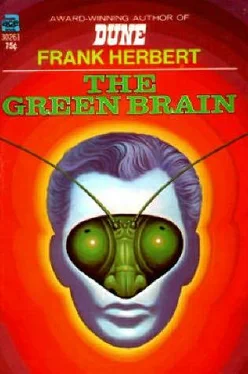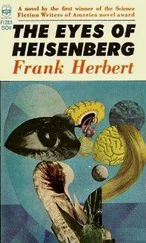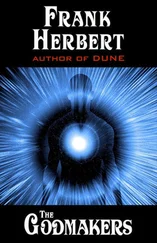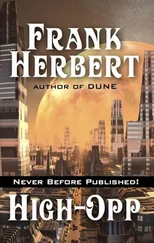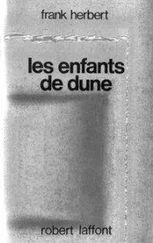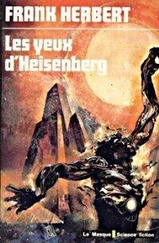Joao stared up at the gray light of the tent ceiling. Very little rocket fuel, damaged controls. They mean to make for the river, of course: float out in the pod. It’ll afford some protection from those… things.
Rhin stood up. “You rest and build up your strength,” she said. “I’ll bring you some food in a little while. We have nothing but field rations, but at least they’re loaded with energy.”
What river is that? Joao wondered. The Itapura, very likely . He made a rough estimate based on his knowledge of the region and the length of his flight over it before the crash landing here. It’ll be seven or eight hundred kilometers by river! And we’re right on top of the rainy season. We don’t stand a chance!
THE DANCING PATTERN of insects on the cave ceiling appeared as a lovely thing to the Brain. It admired the interplay of color and motion while it read the patterned message:
“Report from listeners in the savannah; acknowledge.”
The Brain signaled for the dance to proceed.
“Three humans prepare to flee in the small vehicle,” danced the insects. “The vehicle will not fly. They will try to escape by floating away on the river. What do we do?”
The Brain paused to assess data. The trapped humans had been under observation twelve days. They’d provided much information about their reactions under stress. The information expanded data obtained from captives under more direct control. Ways to immobilize and kill humans became more obvious daily. But the problem wasn’t how to kill them. It was how to communicate with them in the absence of fear or stress on either side.
Some of the humans—like the old one with the grand manner—made offers and suggestions and appeared to display reason… but could they be trusted? That was the key question.
The Brain felt a desperate need for observational data on humans under conditions it could control without that control being noticed. Discovery of the listening posts in the Green had aroused a frenzy of human activity. They used new sonotoxics, deepened their barriers, renewed their attacks on the Red.
Another worry compounded all this—the unknown fate of four units which had penetrated the barriers before the Bahia catastrophe. Only one had returned; its report: “We became twelve. Six gave up unit-identity to envelop the area where we captured the two human leaders. Their fate is unknown. One unit was destroyed. Four dispersed to produce more of us.”
Discovery of those four units at this time would be catastrophe, the Brain realized.
When would the simulacra emerge? That depended on local conditions—temperature, available foods, chemicals, moisture. The lone unit that had returned had no knowledge of where the four had gone.
We must find them! the Brain thought.
The problems of individually-directed action dismayed the Brain then. The simulacra were a mistake. Many identical units would only attract disastrous attention.
That the simulacra meant no great harm and were conditioned only to limited violence had no meaning under present conditions. That they wanted only to be allowed to speak and to reason with human leaders—this plan carried only pathos and irony now.
The reported words of the human called Chen-Lhu came back to plague the Brain: “ Debacle… barren earth .” This Chen-Lhu offered a way to solve their mutual problem, but what were his true intentions? Could he be trusted?
The Brain suspended decision, directed a question at its minions: “Which humans will try to escape?”
Attention must be paid to such details, the Brain knew. Hive orientation tended to ignore individuals. The error with the simulacra had originated in this tendency.
On the surface, the Brain knew its problem appeared deceptively simple. But just under the surface lay the hellish complications of emotional triggers. Emotions! Emotions! Reason had so many barriers to hurdle.
The messengers had consulted their listening-post data. Now they danced out the name sounds: “The latent queen, Rhin Kelly, and the ones called Chen-Lhu and Joao Martinho.”
Martinho , the Brain thought. That was the human from the other half of the airtruck. In this fact lay an indication of the humans’ complicated quasi-hive kinship. There could be value in that relationship. And Chen-Lhu would be in the vehicle, as well.
The insects on the ceiling, having been bred with a repeat factor to insure communication, repeated their previous question:
“What counter action is required?”
“Message to all units,” the Brain said. “The three in the vehicle will be allowed to escape to the river. Offer just enough resistance to make it appear we oppose the escape. They are to be followed by action groups capable of disposing of them whenever necessary. As soon as the three have reached the river, overwhelm the ones who remain.”
Messenger units began assembling overhead, dancing the pattern to imprint it. They took off in compact groups, darting out of the cave-mouth into the sunlight.
The Brain admired the color and motion for a few minutes, then lowered its sensors, set itself to the problem of overcoming protein incompatibility.
We must produce immediate and consequential benefits that the humans cannot fail to recognize , the Brain thought. If we can demonstrate dramatic usefulness, they may yet be brought to understand that interdependence is circular, inextricably entangled and a matter of life and death .
They need us and we need them… but the burden of proof has fallen on us. And if we fail to prove it, this will be truly barren earth.
“It will be dark soon, Jefe,” Vierho said. “You will go then.” Vierho swung the pod’s canopy forward, leaned into it.
Joao stood one step behind him, still feeling weak and plagued by occasional flash-cramps in his left leg above the energy pack. The direct feed and specialized hormones could only approximate the needs of a specific body, and Joao could feel himself half poised against strange tensions because of this treatment.
“I have put the food and other emergency supplies here under the seat,” Vierho said. “There’s more food in the gig-box there in the back. You have two sprayrifles with twenty spare charges, one hard-pellet carbine. I’m sorry we have so little ammo for it. There’re a dozen foamal bombs under the other seat, and I’ve tied a hand-spray rig into the corner back there. It’s fully charged.”
Vierho straightened, glanced back at the tents. His voice fell to a conspiratorial whisper. “Jefe, I do not trust the Doctor Chen-Lhu. I heard him when he thought he was dying. This new face is not like him.”
“It’s a chance we have to take,” Joao said. “I still think you or one of the others who weren’t as sick should go in place of me.”
“No more talk of that, Jefe, please.”
Again Vierho’s voice fell to the conspiratorial whisper: “Jefe, step close to me as though we are saying goodbye.”
Joao hesitated, then obeyed. He felt something metallic and heavy pushed into the belt pocket of his uniform. The pocket sagged with it. Joao pulled his jungle jacket around to cover the sag, whispered, “What’s that?”
“It belonged to my great grandfather,” Vierho said. “It is a pistol called the .475 Magnum. It has five bullets and here are two dozen more.” Another packet was slipped into the side pocket of Joao’s jacket. “It’s not much good except against men,” Vierho said.
Joao swallowed, felt tears dampen his eyes. All the Irmandades knew the Padre carried that old blunderbuss and wouldn’t part with it. The fact that he parted with it now meant he expected to die here—likely true.
Читать дальше
